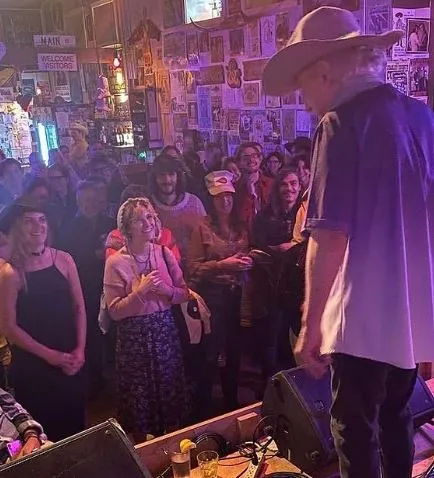Patrick Haggerty passed away surrounded by his partner and kids. He was widely regarded as the first openly gay country musician to ever exist.
According to a post on his band’s Instagram page, he might spend his last moments at home in the warm embrace of family.
He would later suffer a stroke and pass away.

As the first known gay-themed record to be released, the band’s name and debut album, Lavender Country, signaled a turning point for queer representation in the country music industry.
Lavender Country allegedly started a whole movement within the genre and advanced discussions about LGBTQ+ rights that are still going on today, according to the Journal of Country Music.
In a statement honoring heritage and memory and urging people to show love and unity for one another, the band reflected on Haggerty’s legacy and memory.
Making a place for himself as a queer artist within a historically conventional genre was something that Patrick Haggerty did, and in the process, he left a lasting legacy of inclusivity.
The folk-country group Lavender Country from Seattle, Washington, released their debut album in 1973. Patrick Haggerty provided the lead vocals and played the guitar; Michael Carr played the keyboard; Eve Morris sang and played the fiddle; and Robert Hammerstrom played the guitar. Gay Community Social Services released the record in a limited edition of 1,000 copies.
Lavender Country’s career began with the upbeat melodies of “Cryin’ These Cockeroo Tears” and “Come Out Singing,” which captivated many listeners.
Even though the band’s lineup had changed over the years, Haggerty continued to serve as the frontman as Lavender Country released their second studio album, Blackberry Rose, in 2022.

They performed at Pride and LGBT gatherings all over the West Coast. After a three-year journey together, Lavender Country split up in 1976, but they left a lasting impression on a lot of hearts.
Lavender Country was forgotten about until 2000, when a story about gay country musicians sparked interest in them again and led to their reunion for one last show. Lavender Country Revisited, a five-song EP they also released, contained remastered versions of their groundbreaking debut album as well as two brand-new songs.
Many listeners still find meaning in these songs today as a reminder of LGBT pride and bravery in the face of prejudice in the 1970s.
Lavender Country’s composer, fearless activist, and storyteller Patrick Haggerty passed away. He was a well-known member of the music industry who was well-known for his anti-fascist initiatives and for fusing his activism with his art.
2014 saw a label re-release Lavender Country’s debut album, which was accompanied by a string of reunion performances. His inclusion in the Dan Taberski-directed documentary These C*cksucking Tears at SXSW in 2016 cemented his status as a role model for many.
It’s pretty amazing to realize that my anti-fascist work and my art have become intertwined, Haggerty said recently in a positive interview with Pitchfork magazine about how it felt to combine his two passions of activism and art while performing.
”.
“I have finished the circle. My life’s work allows me to put my artistic talent and clumsiness to use on stage as a screaming Marxist swine. I can be who I really am because I’m free.
His death has had a profound impact on those who knew him and beyond. Since the pandemic is still going strong, Haggerty’s friends, colleagues, fans, and family must grieve for him from a distance.
His activism and contribution to the development of the distinctive Lavender Country sound, which had a significant impact on modern music, will live on for a very long time in people’s memories.
Patrick’s 1973 album, which is regarded as the first openly gay country record, brought about his long-awaited recognition. For us, Patrick was more than just a hero; he was someone we could look up to, work with, and even consider taking the place of family.
Patrick felt that Lavender Country had passed him by at the time because he was only performing occasionally at nursing homes.
Instead of being his job anymore, he now enjoyed playing music.
He set an example for how to confront prejudice while vehemently spreading messages of love, and his moving melodies and admirable actions as a father figure, social activist, and musician continue to motivate me today. His wise father warned him, “Don’t be sneaky.”.
On behalf of all of us who adored him just as much as you did, I send my deepest condolences.
